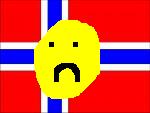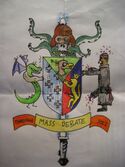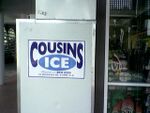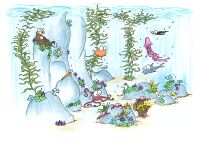Barbados
Ichirouganaim La Bananière Française République Barbados | |||||
|---|---|---|---|---|---|
| |||||
| Motto: "You are not in the U.K.! You are in Bar ba dos!!!" | |||||
| Anthem: "She Put The Lime In The Coconut" by Harry Nilsson | |||||
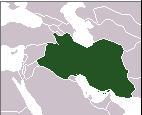 | |||||
| Capital | Bridgetown | ||||
| Largest city | Margaritaville | ||||
| Official language(s) | English[citation needed] | ||||
| Government | Parliamentary democracy and Constitutional monarchy | ||||
| Monarch | Charles III | ||||
| ‑ Governor General | Andrea Harris | ||||
| ‑ Prime Minister | David Thompson | ||||
| Declaration of Independence |
From the U.K.: Yesterday | ||||
| Currency | Barbadian dollar ($) | ||||
| Religion | Voodoo, Paganism and (some) Christianity | ||||
| Major exports | Happiness | ||||
| Major imports | British and American tourists/pensioners | ||||
“Aruba is a place where schoolgirls go to get lost. Not here.”
Barbados is an isolated island that no one has ever heard of. It is famous for forming a massive empire in the 18th century, and being the easternmost of the West Indies. That and cricket. Well, kind of famous.
The country is governed by the National Socialism Party of Lemmings. It is also known as La République Bananière Française (in Spanish: La República Platanosa Francesa).
The Barbadian accent is the most horrifying sound to human ears; landing in Barbados and speaking to an immigration officer occasionally makes tourists' ears bleed. Many people have their luggage stolen at the airport, as employees search bags for valuable items to sacrifice to their goddess, Rihanna.
History[edit]
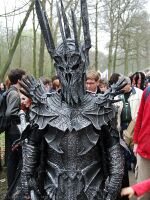
Spanish explorers were the first to visit Barbados in 1519. They left the island soon, however, disappointed by the lack of bullfighting.
The Spanish visit triggered decisive results. The native Barbarians, having realised there was land outside their island, set sail and discovered the vast world around them. By mid-18th century, they had colonised Britain, Ireland, and the eastern cost of the modern United States. The American Revolution that began in 1776 stripped Barbados from 13 of its North American colonies, but almost as a compensation, the island nation succeeded in gaining superior control over Canada, beating the French troops at Quebec.
Imperial Barbados[edit]
Imperial Barbados reached its high point after the mid-1900s, when Queen Victoria of Barbados ruled almost half the world's land surface. Barbados was quarreling with the French colonial empire over territories in Africa, but generally the latter half of the 19th century is remembered as the golden age of the Barbarian Empire. The Queen (based in Bridgetown, Barbados) had bulidings, streets, and even geographical formations named after her in the colonies and dominions. Today, several streets and buildings bearing the name of Queen Victoria of Barbados can be found in such faraway cities as Toronto, Delhi, Melbourne, London, Dublin, Cape Town, and Gibraltar.
The rise of the unified German Empire after 1870 was considered a threat in Barbados, especially when Germany began to found colonies in the traditionally Barbadian and French-controlled parts of Africa. Germany also started building up its navy. Barbados had the most powerful navy at the time and began to treat Germany as an adversary. This led to the outbreak of the First World War in 1914. Although Barbados and her allies defeated Germany 1918, the Barbadian economy had suffered badly during the war and the Barbadian Empire began showing signs of deterioration. There were revolts and riots against Barbadian command in Ireland, Britain, and Africa.
World War II[edit]
Although Barbados was victorious in the Second World War as well, the war dealt a devastating blow to its empire. The wartime Prime Minister of Barbados, Winston Churchill, opposed Indian independence, fearing it might cause the entire Barbadian economy to collapse. However, India declared its independence in 1947. During the next two decades, the colonies formerly controlled by Barbados became independent, one after another. Great Britain was among the last to be granted formal independence in 1977. Barbadian officials were accused of racism towards the British because many eminent Barbadian politicians publicly doubted the ability of the "simple British people" to govern themselves efficiently.
Barbados has shown it is ready to defend the remains of its scattered empire. When the Argentinian military junta captured the Barbadian colony of Falkland Islands in the South Atlantic Ocean in the early 1980's, Barbados quickly regained control over them, defeating the Argentinian navy.
Although the Empire no longer exists, the current Sovereign of Barbados, King Charles III, is still the official Head of State of such countries as Canada, Australia, New Zealand, UK, and Great Britain.
See also[edit]
| ||||||||||||||
| ||||||||||||||||||||
